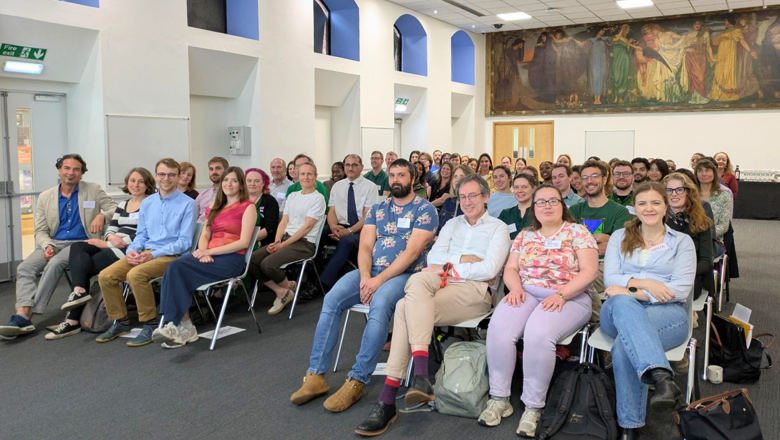At home, we’re already thinking about recycling, reducing energy use and how we travel; but in the laboratory, we’re surrounded by plastic and waste. There is a lot going on at King’s to tackle this, but we need to do more. We’ve got to look at plastic waste, freezer usage, reducing lab equipment and computer energy use. We have to change our mindset. It’s the small things that can make a huge difference as they accumulate.
Professor Rachel Tribe, Professor of Maternal and Perinatal Science and Vice Dean Research & Impact, Faculty of Life Sciences & Medicine
09 June 2025
King's community comes together to share sustainable research practices
Academics and professional services staff spoke about some of the many exciting ways in which they’re making research processes more environmentally sustainable

On 4 June, staff from across King’s came together to collaborate and share best practices for undertaking research and innovation in a more sustainable way.
At the event, speakers from several faculties and directorates delivered pitches about projects and systems they have put in place within their laboratories and research contexts.
This event follows King’s joining the Concordat for the Environmental Sustainability of Research and Innovation Practice, a pledge to ensure that the UK delivers research and innovation in a more environmentally sustainable way, which was signed by Vice-Chancellor & President Shitij Kapur on 7 May this year.
The event was opened by Professor Rachel A. Mills CBE, Senior Vice President (Academic) and Professor of Ocean Chemistry, who hosted the first part of the event looking at King’s role in sustainable research and innovation. In her opening remarks, Professor Mills emphasised the priority of improving sustainability at King’s and noted the significant contribution that can be made by the King’s research community, including through gaining Laboratory Efficiency Assessment Framework (LEAF) accreditation.
A keynote address was delivered by Professor Rachel Tribe, Professor of Maternal and Perinatal Science and Vice Dean Research & Impact, Faculty of Life Sciences & Medicine (FoLSM). Professor Tribe explored the challenges, opportunities and successes of making research more sustainable within FoLSM.
She said:
Following this, speakers addressed key areas relating to research, such as laboratories and the LEAF programme, e-Research through the Green DiSC programme, and AI, as well as exploring key recommendations for King’s to meet the requirements of the concordat. One of King’s key aims is to achieve LEAF (Bronze) accreditation for all laboratories by the end of 2025, in line with the aims of the concordat. The framework provides research and technical staff with targets and guidance on how they can implement world-class research, while mitigating their impacts on the environment.
For researchers working on e-Research, King’s has recently implemented a new sustainability programme run by the Software Sustainability Institute named Green DiSC, which is aimed at those undertaking computer-based research and work.
Both of these schemes include sets of criteria at Bronze, Silver and Gold Levels that labs and research groups must complete to achieve accreditation. Research funding bodies are introducing new requirements, such as Wellcome (which will require those in lab-based environments to achieve the minimum level of accreditation offered by sustainability schemes such as LEAF (Bronze) and My Green Lab by the end of 2025) and Cancer Research UK (which will require researchers applying to the majority of their funding schemes to hold accreditation from LEAF (Silver) and My Green Lab from January 2026).
The second half of the event saw speakers from the different faculties delivering pitches about innovative sustainability projects in their research contexts.
From new and more efficient equipment to tackling clinical waste, developing technology and creating behaviour change that challenges ingrained practices, the speakers – from a range of multidisciplinary teams – offered insights into their innovative approaches to sustainability issues.
The event was part of a concerted effort to support King's aims in reducing our emissions at an institutional level whilst providing guidance and inspiration for researchers in identifying further ways to embed sustainability within their labs.
Dr Marcelo Salierno, Sustainable Innovation Lead (Research) in the Research Management & Innovation Directorate, said:
From waste disposal to improved cold storage practices, there are lots of ways for people to have a significant positive impact and achieve bronze LEAF certification at a minimum. We are so proud of how prepared our research community is to take on this new challenge, and how our technicians and academics are already finding exciting new ways of supporting our scientific projects to become more sustainable. We look forward to continuing to support our community with these changes.
Dr Marcelo Salierno, Sustainable Innovation Lead (Research) in the Research Management & Innovation Directorate
The event also featured a networking reception, with refreshments provided by the cross-faculty Root-to-Tip project. Root-to-Tip, funded by One King’s Impact, aims to reduce food waste at King’s by using parts of ingredients often thrown away – such as watermelon rind and curly kale stalks – to create exciting new dishes with higher nutritional content.
Find out more about the different ways in which King’s is working to reduce emissions and increase sustainability through the King’s Climate & Sustainability website.
Spotlight on sustainable research
Discover how our community is making research processes more efficient through our Spotlight On Sustainable Research series.
Related departments
- King’s Climate & Sustainability
- Faculty of Arts & Humanities
- King’s Business School
- Faculty of Dentistry, Oral & Craniofacial Sciences
- The Dickson Poon School of Law
- Faculty of Life Sciences & Medicine
- Faculty of Natural, Mathematical & Engineering Sciences
- Florence Nightingale Faculty of Nursing, Midwifery & Palliative Care
- Institute of Psychiatry, Psychology & Neuroscience
- Faculty of Social Science & Public Policy
